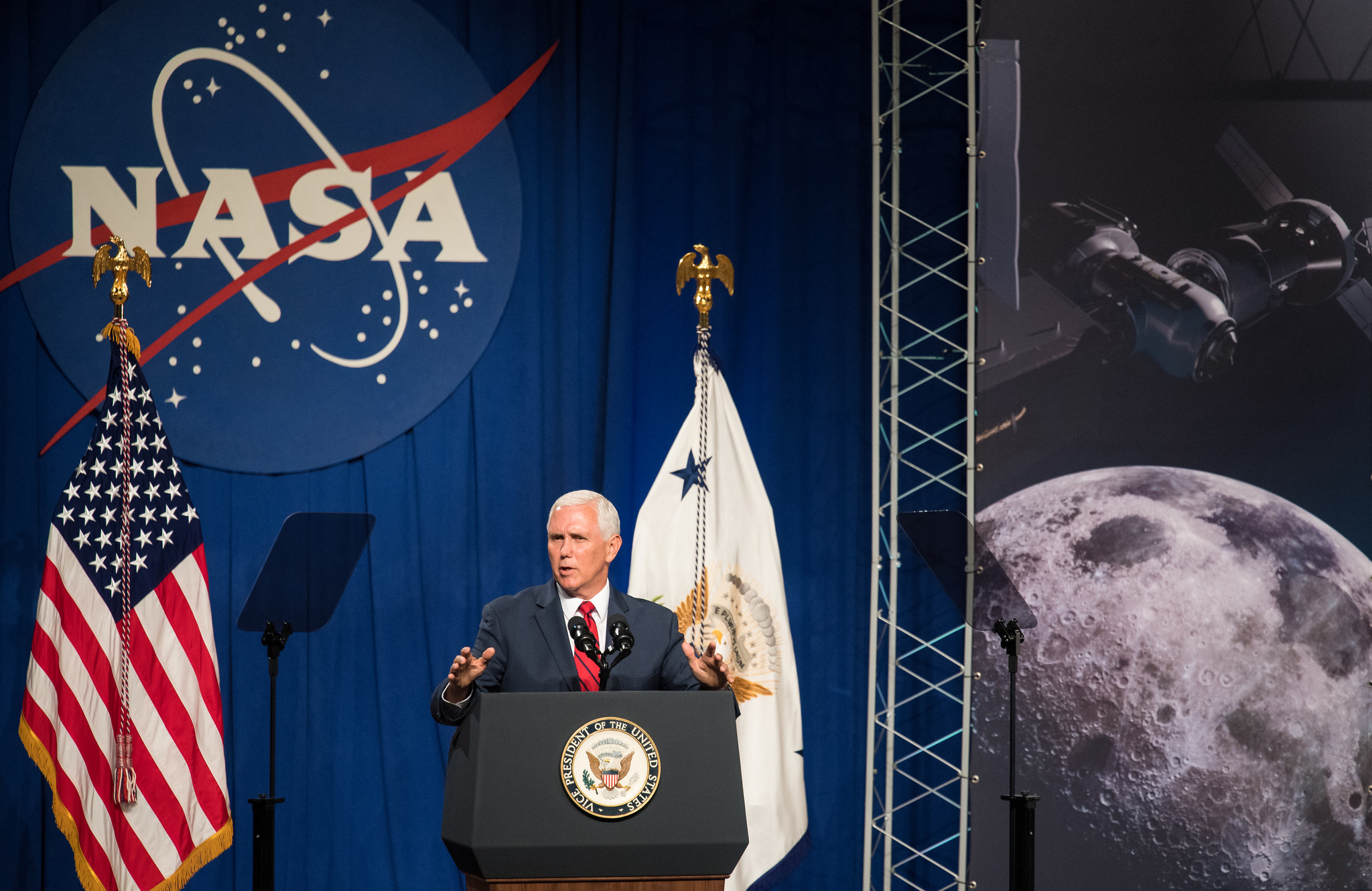US Astronauts Could Fly to Moon-Orbiting Station by 2024, Pence Tells NASA
In a speech full of commendation but without much concrete substance, U.S. Vice President Mike Pence discussed the future of the country's space policy and highlighted the importance of a moon-orbiting space station that could host U.S. astronauts by 2024.
The vice president spoke today (Aug. 23) at NASA's Johnson Space Center in Houston after touring the facilities with Apollo 17 astronaut Jack Schmitt, who traveled on the country's last crewed mission to the moon, in 1972.
"While our sights are once again set on our lunar neighbor, this time we're not content with just leaving behind footprints — or even to leave at all," Pence told the crowd of NASA employees. "The time has come, we really believe, for the United States of America to take what we have learned over these so many decades, put [NASA's] ingenuity and creativity to work, and establish a permanent presence around and on the moon." [Presidential Visions for Space Exploration: From Ike to Trump]
To do that, he said, the U.S. would start with a long-term orbital platform near the moon.
"Last year, NASA began to work with American innovators to design [the Lunar] Gateway's unique electrical propulsion system. We're working with the Congress to provide an unprecedented $500 million to move the Lunar Orbital Platform from proposal to production," he added. "We're only a few short years away from launching the Gateway's first building blocks into space, turning science fiction into science fact. And our administration's working tirelessly to put an American crew aboard the Lunar Orbital Platform before the end of 2024."
Pence also said that as NASA uses the Space Launch System (SLS) rocket and Orion spacecraft, which are both under development, to push toward the moon and beyond, commercial space companies could fill in the gaps closer to home. (The first test of SLS and Orion together, without a crew, is planned for 2019 or 2020.) That work, by companies like SpaceX and Boeing, will include pushing the industry forward in low Earth orbit and providing rides to the International Space Station. (Pence added that the U.S. currently pays Russia's space program about $82 million per seat on trips to the station.)
Pence ran through the accomplishments so far of the presidential administration and the newly restarted National Space Council he chairs: resolving to reduce red tape for launches, create new policies for managing space traffic and make returning to the moon an explicit U.S. policy goal. And he discussed security in space, referring to President Donald Trump's plan to create a Space Force to support national security off the planet.
Breaking space news, the latest updates on rocket launches, skywatching events and more!
The cancellation of previous efforts to reach the moon "said to NASA, it said to our country, to the entire world, that America was no longer serious about human space exploration," Pence said. "We talked about going to Mars, but without the moon as a stepping stone, without stronger commercial partnerships to help us get there, a crewed mission to the Red Planet was not much more than a mirage.
"But these days are over," he added. "America will lead mankind to the stars once again."
Email Sarah Lewin at slewin@space.com or follow her @SarahExplains. Follow us @Spacedotcom, Facebook and Google+. Original article on Space.com.

Sarah Lewin started writing for Space.com in June of 2015 as a Staff Writer and became Associate Editor in 2019 . Her work has been featured by Scientific American, IEEE Spectrum, Quanta Magazine, Wired, The Scientist, Science Friday and WGBH's Inside NOVA. Sarah has an MA from NYU's Science, Health and Environmental Reporting Program and an AB in mathematics from Brown University. When not writing, reading or thinking about space, Sarah enjoys musical theatre and mathematical papercraft. She is currently Assistant News Editor at Scientific American. You can follow her on Twitter @SarahExplains.

